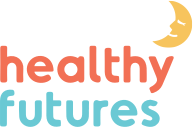Your Baby
At two months of age, your baby may:
Hold his/her head up while on his/her tummy – Your baby needs to spend some time every day on his tummy while awake to help with proper development. “Tummy time” on a firm surface is important for later developmental milestones, such as head control, sitting, rolling, and crawling.
Start Communicating and building trust – Care of a two-month-old is difficult since he cannot tell you what is hurting him. But your baby will smile and coo when happy or cry when he is not. Stay calm and try different ways to soothe him. Remember that you are your child’s first and most influential teacher. You are teaching your baby to trust, which is the key building block for growth and learning. Babies need to be held and to know you are there for them.
Gain five to eight ounces per week – You should be breastfeeding around every three or four hours or providing 24 to 36 ounces of formula per day to maintain healthy weight growth. Remember that growth spurts are common between six and twelve weeks of age. Your baby may breastfeed more frequently during these times and your body will increase milk supply.
Sleep 14-18 hours per day
Follow Bright Objects
Suck finger, thumb or pacifier without being hungry
Your Family
You may already be thinking about returning to work. If you plan to continue breastfeeding there are many possible strategies for continuing that once you return to work. The “right” approach depends on your personal circumstances. Some moms are able to nurse their infants on their lunch hour; some are able to send expressed milk with their infants for the day, and others decide to supplement with formula while they are away. For some employers, it may be beneficial to educate them on how the workplace can support breastfeeding. You could inform your employer about the long-term benefits of breastfeeding: fewer respiratory-tract and ear infections as well as a reduced risk of food allergies, not to mention the positive effects that breastfeeding can have on the productivity level of a satisfied working mother. There are many professionals and products available to assist you in this transition. Contact your Healthy Futures nurse for more information and helpful resources.
If you are still looking for child care, visit greatstartconnect.org or call 1-877-614-7328 to find quality licensed care near you in northern Michigan.
It is healthy for parents to take a break from their baby. Accept childcare help from family and friends. When considering a babysitter, keep in mind the sitter’s age, experience with infants, and whether the sitter has completed a babysitting class.
Your Checklist
Educate yourself on the safe use of baby products and equipment. Some baby equipment sold in stores can be harmful or may hurt your baby’s growth and development. For more information, visit greatstartkids.com and click on “Docs and Links” tab.
Don’t forget to vaccinate! Vaccine-preventable diseases can cause serious harm to children who are not fully immunized. Your baby is due for his two-month immunizations and well-baby checkup. Call your baby’s health care provider or your local health department to make an appointment
Remember the safe sleep guidelines. Babies need to sleep on their backs, alone and in a crib with a tight-fitting sheet and no blankets, quilts or stuffed toys. In addition, breastfeeding and keeping a smoke-free environment in the car and home are some things parents can do to help keep babies healthy.
Your Healthy Futures Nurse is also here for you. Contact your healthy futures nurse if you have any questions or concerns.
Questions to ask your Health Care Provider
Your baby’s fluoride and Vitamin D needs vary depending on whether she is breastfed or bottle-fed. A daily vitamin/mineral supplement may be recommended at this time for infants who are solely breastfed. Ask your baby’s health care provider about the supplemental vitamin and mineral needs of your baby.




